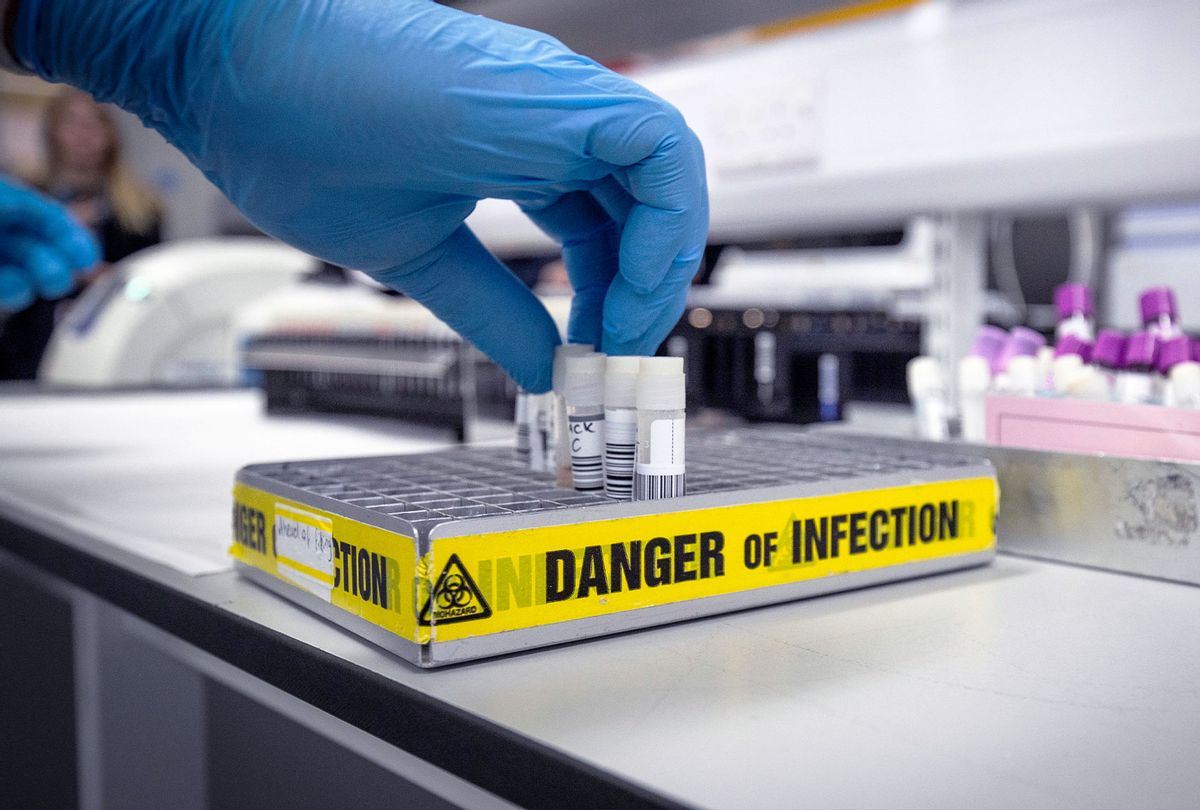While the COVID-19 pandemic has been undeniably bad, the extremely contagious omicron variant is setting scientific records. The mutant SARS-CoV-2 variant came seemingly out of nowhere, continues to have unknown origins and has so far spawned several ominous relatives including the so-called "Son of Omicron."
Now, scientists have revealed something particularly disturbing: The omicron variant is either the first or second most contagious virus known to humanity, depending on how you measure it.
The slight uncertainty between gold and silver place depends on how you define "most contagious of all time." If you do so by measuring the speed at which a disease spreads throughout the planet, then omicron is the clear winner.
RELATED: "Son of omicron" variant worries public health officials amid new wave of COVID-19 infections
"You can have an extraordinarily contagious virus, we see that right now with COVID," Dr. William Schaffner, a professor of infectious diseases at the Vanderbilt University Medical Center, told Salon. "COVID is approaching the contagiousness of the virus that we think is the most contagious ever studied, namely the measles."
The measles virus was long considered the gold standard for contagiousness. The virus has a reproductive number (R0) that varies between 3.7 to 203.3, meaning that one infected person is apt to infect between 3.7 and 203.3 people. In the sixteenth century, two-thirds of the indigenous population of Cuba was killed by the disease.
Other scientists concurred with Schaffner's conclusion that is is approaching the contagiousness of measles.
"Omicron is certainly the most rapidly spreading virus among the ones we have been able to investigate at this level of detail," Dr. William Hanage, an epidemiologist and the co-director of the Center for Communicable Disease Dynamics at Harvard University, told El Pais.
As PolitiFact succinctly explained, "When measuring the speed of global spread, the omicron variant of SARS-CoV-2 is the fastest in history, experts say." Yet things get murkier when you define contagiousness by how quickly a disease spreads between individuals. At that point, it starts facing steep competition from measles.
Want more health and science stories in your inbox? Subscribe to Salon's weekly newsletter The Vulgar Scientist.
"One of the things about Omicron that is very different from all of the other variants of this COVID virus is that its transmissibility efficiency is at least twice what any of the other strains of this COVID virus has been," Deborah Hayes, president and CEO of The Christ Hospital, said during a briefing with reporters earlier this month. "It is a virus that spreads almost as, if not as, easily as measles."
Some argue that omicron does indeed spread faster and easier than measles. Dr. Roby Bhattacharyya, a physician and infectious disease expert at Massachusetts General Hospital, told El Pais that omicron has an advantage over measles because of how it spreads. If you look at the amount of time which elapses between a person becomes infectious and the people they infect also become infectious, that takes an average of 12 days for the measles and only four or five days for omicron.
"One case of measles would cause 15 cases within 12 days. One case of omicron would give rise to another six at four days, 36 cases at eight days and 216 after 12 days," Bhattacharyya pointed out. This makes omicron unusually infectious even when compared to the measles — and certainly quite infectious if compared to the previous SARS-CoV-2 viruses that caused COVID-19.
"Omicron's reproductive number (R0) is estimated to be as high as 10, second only to the extremely infectious measles, mumps, pertussis, and varicella," Vanderbilt University's Dr. Sanjay Mishra and Dr. Jeremy Warner wrote in The Cancer Letter. "This compares to R0 of 2.5 for the original strain of SARS-CoV-2 and ~5 for delta. Because this number is an exponential coefficient, a "doubling" of R0 portends for an extreme jump in infectiousness."
Even after omicron has left the scene, there are still lingering conditions for new mutant viruses like omicron to emerge.
"It's a certainty," Dr. William Haseltine, a biologist renowned for his work in confronting the HIV/AIDS epidemic, fighting anthrax and advancing knowledge of the human genome, told Salon earlier this month when asked if other variants should be expected. "It's not a fear. There will be more variants. It is as close to a certainty as you can get."
Read more about the omicron variant:



Shares